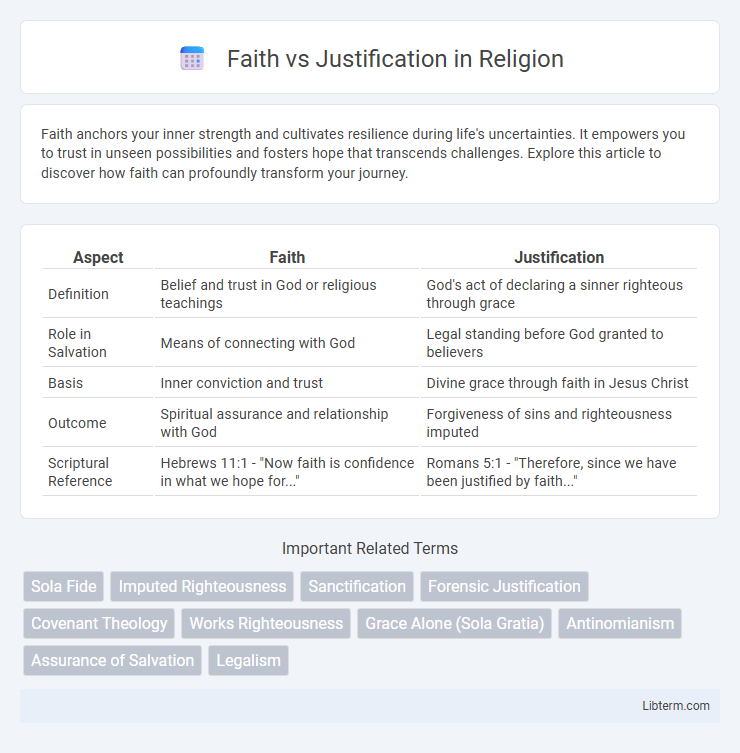Faith anchors your inner strength and cultivates resilience during life's uncertainties. It empowers you to trust in unseen possibilities and fosters hope that transcends challenges. Explore this article to discover how faith can profoundly transform your journey.
Table of Comparison
| Aspect | Faith | Justification |
|---|---|---|
| Definition | Belief and trust in God or religious teachings | God's act of declaring a sinner righteous through grace |
| Role in Salvation | Means of connecting with God | Legal standing before God granted to believers |
| Basis | Inner conviction and trust | Divine grace through faith in Jesus Christ |
| Outcome | Spiritual assurance and relationship with God | Forgiveness of sins and righteousness imputed |
| Scriptural Reference | Hebrews 11:1 - "Now faith is confidence in what we hope for..." | Romans 5:1 - "Therefore, since we have been justified by faith..." |
Understanding the Concepts: Faith and Justification
Faith represents a believer's trust and confidence in God's promises, while justification is the divine act of declaring a sinner righteous based on that faith. The concept of justification is central to Christian theology, emphasizing that salvation is a gift granted through faith rather than human works. Understanding these concepts involves recognizing faith as the means by which justification is received, highlighting the relationship between belief and being made right before God.
Historical Perspectives on Faith and Justification
Historical perspectives on faith and justification trace back to early Christian theology, where Augustine emphasized faith as the foundation for justification, aligning it closely with divine grace. The Protestant Reformation, led by Martin Luther, revolutionized this concept by asserting justification through faith alone (sola fide), rejecting the Catholic emphasis on works and sacraments. This theological debate shaped Western Christian doctrine, influencing both Catholic and Protestant interpretations of salvation, grace, and human righteousness.
Biblical Foundations of Faith
Faith, as defined in Hebrews 11:1, is the assurance of things hoped for and the conviction of unseen realities, serving as the foundational response to God's promise. Justification is the legal declaration by God, as stated in Romans 5:1, where a believer is declared righteous through faith in Jesus Christ, not by works of the Law. The biblical foundation establishes that faith is the means by which justification is received, emphasizing trust in Christ's redemptive work as the basis for right standing before God.
Scriptural Insights into Justification
Justification, central to Pauline theology, is depicted in Romans 5:1 as being "justified by faith," emphasizing faith as the means of acquittal from sin rather than works of the Law. Galatians 2:16 reinforces that "a person is not justified by works of the law but through faith in Jesus Christ," highlighting the transformative power of belief over ritual observance. Hebrews 10:38 cites faith as fundamental to righteousness, declaring that "the one who draws back is not pleasing to God," which underscores the imperativeness of steadfast faith for maintaining justified standing before God.
Faith and Justification in Christian Theology
Faith in Christian theology is the confident belief and trust in God's promises, centered on the person and work of Jesus Christ. Justification is the divine act by which God declares a sinner righteous based on faith, not on personal merit or works. This foundational doctrine emphasizes that faith alone, as a means of receiving God's grace, results in justification and reconciles believers with God.
Differences Between Faith and Justification
Faith involves a personal trust and belief in God, serving as the means by which individuals accept salvation. Justification is the legal declaration by God that a person is righteous, based on the forgiveness of sins through Christ's atonement. While faith is the action of trust, justification is the resulting status granted to the believer.
The Interdependence of Faith and Justification
Faith and justification are intrinsically linked, as justification is the divine act by which a believer is declared righteous through their faith in Christ. Faith serves as the means by which individuals receive justification, emphasizing trust in the redemptive work of Jesus as the basis for being accounted as righteous before God. This interdependence highlights that justification is not earned by works but granted through faith, underscoring the foundational role of belief in the doctrine of salvation.
Debates and Controversies: Faith versus Works
The debate over faith versus works centers on whether justification before God comes solely through faith or requires a combination of faith and good works. Protestant reformers like Martin Luther emphasized justification by faith alone (sola fide), while Catholic doctrine asserts that faith complemented by works is necessary for salvation. This ongoing controversy fuels theological discussions about grace, salvation, and the role of human effort in Christian life.
Faith, Grace, and Justification: Theological Implications
Faith serves as the essential means through which believers receive God's grace, enabling justification as a transformative legal declaration of righteousness. Theological perspectives emphasize faith not only as trust in divine promises but also as an active reliance on grace to reconcile humanity with God. Justification, rooted in grace and accessed through faith, underscores the profound implication that salvation is a gift rather than a human achievement.
Living Out Faith and Justification in Daily Life
Living out faith and justification in daily life involves actively embodying the transformative power of grace through consistent actions that reflect inner belief. Practicing compassion, integrity, and forgiveness serves as tangible proof of justification by faith, demonstrating a genuine spiritual renewal. Engaging in regular prayer, ethical decision-making, and community service reinforces the ongoing relationship between faith and righteous living.
Faith Infographic

 libterm.com
libterm.com